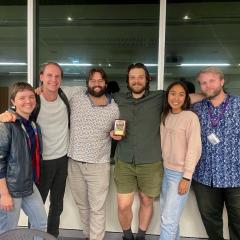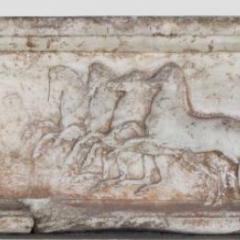Kriston Rennie, Associate Professor in Medieval History
A mobile Medieval historian stretches his legs further
I guess it’s a typical story—how I became a historian. I was not a good student, but I had good teachers. I had a choice in high school, and I didn’t have a plan, but a guidance councillor picked history for me. In university I had a lot of good profs who inspired me. I took religion as a second major too and I wanted to combine them. I was steered towards Medieval history. Now I write on topics that include the impact of plague and the wartime destruction of Monte Cassino abbey.
It’s taken me around the world, from a PhD at Kings College London, to Scotland, Canada and New Zealand, to my first permanent job here at UQ and fellowships in England, Canada, Belgium, Germany, and the USA. That’s been a great part of the experience.
In January I’m taking up a position in Canada at the University of Northern British Columbia (UNBC). I’ll be heading up a new Faculty of Indigenous Studies, Social Sciences and Humanities, leading faculty, staff, and students in the foundational human disciplines. It’s a leadership position with big challenges but enormous potential.
I don’t have enough hobbies. Moving countries disrupts hobbies. A few years ago I (re-)learned how to mountain bike. I was always falling. I lacked the confidence and the skills. I took one-on-one training and I learned some technical things and it’s really helped. I don’t fall anymore and I plan to get my kids in on it. We’ll load up our bikes in our pick-up truck or whatever and head off.
The key to being happy is going all in. There it’s four seasons of outdoor experiences. I’d like to get into canoeing, fly-fishing, camping and skiing. There’s lots of bears, black bears, so we’ll see how that goes.
My first book was an incredibly painful experience. I was told by my PhD examiner that turning my PhD into a book would take years. He was right, it took 5 years. I didn’t know what I was doing. But I had lots of guidance, getting a feel for it. During that time I was publishing articles, getting my foot into conferences and getting into the right circles.
It was one of my most painful experiences but it was one of my proudest moments: ‘I finished it!’ There is something unique about doing a PhD. There are so many original parts that you can’t reproduce later on in your career. You have the time and help for it. Even though my PhD was published by a small publisher, it is my most widely read and reviewed book.
Perseverance: I think my work ethic has pulled me through. I never feel like I am on top of it. I struggle with the languages, but I just work at it. There are boatloads of rejections. Some academics will tell you this, some won’t; some don’t seem to get rejected at all. But rejection is an important part of the process: you get feedback, you make revisions, and you make things better. Sometimes it’s a fit for a publisher, sometimes it’s not.
I unwind by cycling home, de-stressing along the way. I always have classical and jazz in the background, and I enjoy cooking.
Growth happened for me overseas during fellowships, but it was colleagues here at UQ who made it happen. They gave me support to get better as a historian and enabled my international experiences. The international fellowships made me appreciate how lucky I am with what I have here, with opportunities for research and a manageable teaching load. The library here is fantastic, I’ve always had access to all the resources that I need. I’ve learned from the inside about Universities and how they work as globally competitive organisations. A sense of humour has carried me through.
To the younger Kriston, students and early career researchers, I’d say: ‘Don’t limit yourself, go for everything, apply for everything’. You get rejected, but it allows for incredible life experiences where you can shape your working life.
I’ll miss: jumping in the pool after work, though I hate looking after it; looking at the gumtrees in the forest behind our house; listening to the birds; and drinking beer from a lot of Brisbane’s great craft pubs with colleagues.
Narrative and photo by Ryan Williams



